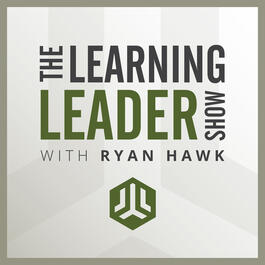
478: Susan Cain - Using Pain To Be More Creative, Finding The Right Life Partner, & A New Way To Think About Death
Text Hawk to 66866 to become part of "Mindful Monday." You along with 10's of thousands of other learning leaders will receive a carefully curated email from me each Monday morning to help you start your week off right! Full show notes at www.LearningLeader.com Twitter/IG: @RyanHawk12 https://twitter.com/RyanHawk12 Susan Cain is the #1 bestselling author of Bittersweet: How Sorrow and Longing Make Us Whole and Quiet: The Power of Introverts in a World That Can't Stop Talking, which spent eight years on The New York Times best-seller list, and has been translated into 40 languages. Susan's TED talks have been viewed over 40 million times. LinkedIn named her the Top 6th Influencer in the World, just behind Richard Branson and Melinda French Gates. Susan partners with Malcolm Gladwell, Adam Grant, and Dan Pink to curate the Next Big Idea Book Club. Notes: "Compassion means to suffer together." How to use sadness? "Make the pain your creative offering." To suffer with other beings brings people together. When people are grieving the loss of a loved one, they often want to talk about that person. Aristotle wondered why the great poets, philosophers, artists, and politicians often have melancholic personalities… his question was based on the ancient belief that the human body contains 4 humors: each corresponding to a different temperament - melancholic (sad), sanguine (happy), choleric (aggressive), and phlegmatic (calm). Joseph Campbell said, "We should strive to participate joyfully in the sorrows of the world." Connecting with what matters and taking committed action—moves us from bitter to sweet, from loss to love." Everyone experiences loss. It is part of the human condition. How have you moved "from bitter to sweet, from loss to love"? Are there coping strategies you recommend? The bittersweet quiz — 1-10. If you scored between 5.8 and 10, you're a true connoisseur of bittersweetness: the place where light and dark meet. Questions: Do you tear up easily at touching TV commercials? Are you especially moved by old photographs? Do you react intensely to music, art, or nature? Have others described you as an old soul? Do you find comfort or inspiration on a rainy day? Are you moved to goosebumps several times a day? Do you feel elevated by sad music? Do you tend to see the happiness and sadness in things, all at once? Do you seek out beauty in your everyday life?" (I scored a 7.1) "The secret to life is to put yourself in the right lighting. For some, it's a Broadway spotlight; for others, a lamplit desk. Use your natural powers -- of persistence, concentration, and insight -- to do work you love and work that matters. Solve problems. make art, think deeply." "The secret to life is to put yourself in the right lighting. For some, it's a Broadway spotlight; for others, a lamplit desk. Use your natural powers -- of persistence, concentration, and insight -- to do work you love and work that matters. Solve problems. make art, think deeply." "There's zero correlation between being the best talker and having the best ideas." "If we could honor sadness a little more, maybe we could see it—rather than enforced smiles and righteous outrage—as the bridge we need to connect with each other. We could remember that no matter how distasteful we might find someone's opinions, no matter how radiant, or fierce, someone may appear, they have suffered, or they will." "The secret that our poets and philosophers have been trying to tell us for centuries, is that our longing is the great gateway to belonging." "The tragedy of life is linked inescapably with its splendor; you could tear civilization down and rebuild it from scratch, and the same dualities would rise again. Yet to fully inhabit these dualities—the dark as well as the light—is, paradoxically, the only way to transcend them. And transcending them is the ultimate point. The bittersweet is about the desire for communion, the wish to go home." "Introverts, in contrast, may have strong social skills and enjoy parties and business meetings, but after a while wish they were home in their pajamas. They prefer to devote their social energies to close friends, colleagues, and family. They listen more than they talk, think before they speak, and often feel as if they express themselves better in writing than in conversation. They tend to dislike conflict. Many have a horror of small talk, but enjoy deep discussions." Life and Career advice: You have to find a way to do it. Life can sweep you up quickly. Establish a backup plan. It frees you up to be more creative. Develop rituals for writing... Purely with pleasure.
From "The Learning Leader Show With Ryan Hawk"




Comments
Add comment Feedback